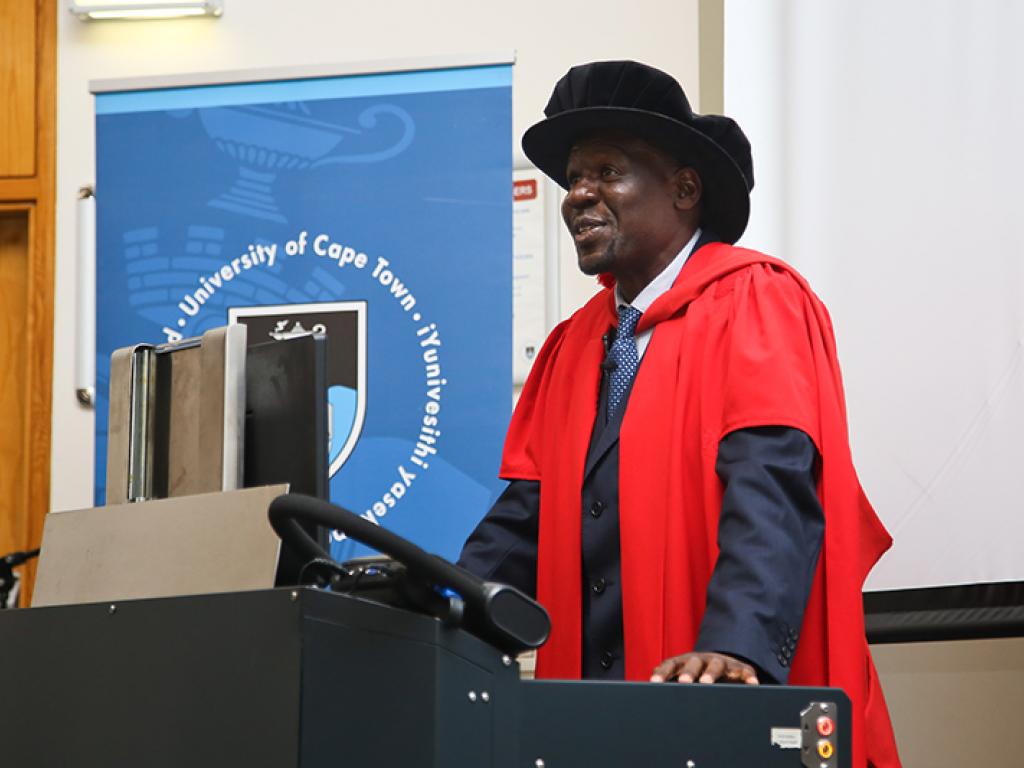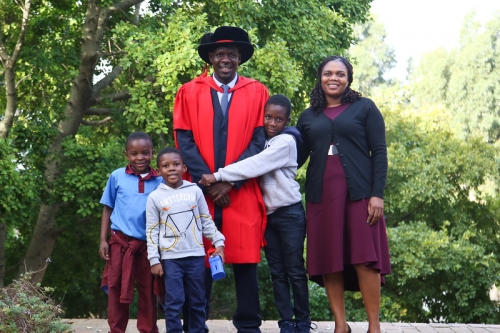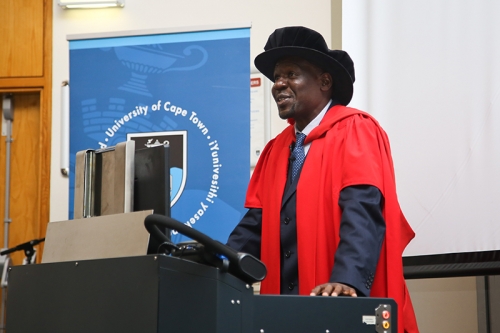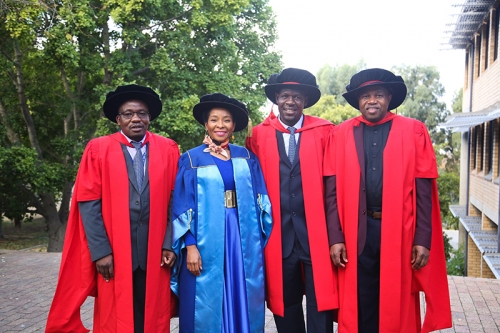Making Africa’s past ‘usable’ for the present


Prof Shadreck Chirikure with his wife, Geraldine, and two of their sons, Tadanaishe and Tawananyasha (embracing Chirikure) with friend Tawanaishe Mundembe (far left). Absent from the family picture is the couple’s youngest son, Tafara
Why does success continue to elude Africa? It was a bold question at the start of Africa Month and archaeologist Professor Shadreck Chirikure provided some answers in his 3 May inaugural lecture, sharing insights from deep history and archaeology.
Archaeological research in Africa has created a vast record of the continent’s dynamic social systems, mobilities and knowledge, revealing sustainable, technologically innovative and resilient African communities across the ages. One example is Great Zimbabwe, a vast multi-building settlement built of granite dry-stone walls, constructed by indigenous people who lived there between AD 1000 and AD 1700 with “varying degrees of intensity”.
Beginning his lecture with a blessing on Africa, Chirikure said that the people of Great Zimbabwe were master builders, craftsmen and workers of precious metals. They were networked and integrated, and traded widely.
“But there’s a great Shona proverb that says we can’t eat past glory,” he said.
Africa remains beset by the perennial challenges of poverty, inequality, malnutrition, disease and unemployment.
“As archaeologists, perhaps we should use our discipline to empower the present and future communities,” he said.
While archaeologists dealt with the past, Chirikure said they had to go beyond “business as usual” to produce locally centred knowledge that is problem-solving and globally competitive.

“As archaeologists, perhaps we should use our discipline to empower the present and future communities. ” – Prof Shadreck Chirikure.
Record of excellence
As an archaeologist, Chirikure’s research interweaves techniques from hard sciences, humanities and the social sciences to explore ancient African technologies and the political economies of pre-colonial state and non-state systems on the continent and beyond.
His record reflects a career of excellence in his field. Head of the Department of Archaeology and director of the Archaeological Materials Laboratory, he has a raft of distinctions and awards. These were charted by the new Dean of Science, Professor Maano Ramutsindela, in his introduction to Chirikure’s lecture.
A former Mandela-Harvard Fellow and a past recipient of the Association of Commonwealth Universities Fellowship at Linacre College, Oxford, Chirikure is one of only 10 inaugural recipients of the British Academy’s highly competitive British Academy Global Professorships
As a mark of the esteem in which he is held, Chirikure will give the 31st MacDonald Institute of Archaeology’s Annual Lecture later this year, one of the highlights at Cambridge University.
What glories did past African societies leave behind? Many will be familiar with the magnificent rock-hewn medieval churches at Lalibela in Ethiopia, literally created from the ground, and the pyramids found in Egypt and other African countries.
“A laboratory for chaos”
“If you want to talk about globalisation, Africa was quite connected throughout the Indian Ocean as well as in the Sahara,” Chirikure said.
“Side by side with that great African past is the Africa of today, which is in some sense, and apologies for the exaggeration, a laboratory for chaos, suffering, poverty and conflict…
“How do we say to those who have no bread that the African past was great?”
“As an archaeologist the question that confronts me on a day-to-day basis is: How do we say to those who have no bread that the African past was great? How do we say to those who have no jobs, that, hey, the pyramids were built by Africans? How does that help us in the present?”
Making Africa’s past “usable” in the context of the present is a challenge that has shaped his research from as early as 2005.
“There is a need to challenge knowledge… And we must also revise concepts and perform what I call disruptive science in the understanding that disruption is also positive in some cases.”
Great Zimbabwe is thought to be the largest pre-colonial structure in Africa south of the Sahara. Its history is contested by many. It was targeted by treasure hunters and then destroyed in the late 19th and early 20th centuries. In 1960 there was a moratorium on all excavations, a perplexing situation for Chirikure who planned to start new work on the site, in search of his own answers.
Looking at a map of the site, he realised that places outside the great walls had significant evidence of human occupation. But this land had been turned into a car park and camping grounds. So, he asked for permission to dig up the car park.
There he found old gold.
Gold in the car park
“My other occupation is gold digger,” he joked.
Fortunately, the authorities recanted, and Chirikure got permission to dig on the hillside site. One of the themes he explored was the idea of social class and a history of inequality at Great Zimbabwe.
Conventional interpretations said the site’s imposing dry walls separated the elite and commoners, who lived outside the walls and lacked access to goods and precious metals. Could this hypothesis stand scrutiny, Chirikure wondered?
After auditing their material findings from the valley enclosures and the unwalled settlements, Chirikure and his team found that materials such as gold, glass beads and local pottery were located across the site, showing universal access. Using remote sensing and geographic information system (GIS) technology, the team produced a map of resource distribution and used geochemistry to track the movement of gold.
This is a significant point when looking at Africa today, he said.
“All we do is consume and we don’t produce what is consumed – and then we hope by some miracle that we can create jobs.”

The platform party are (from left) Prof Collet Dandara, Human Genetics, Division of Pathology, VC Prof Mamokgethi Phakeng, Prof Shadreck Chirikure and Prof Maano Ramutsindela, Dean of Science.
Make our own
Apart from Mapungubwe and Great Zimbabwe, southern Africa had multiple other pre-colonial states. In K2, on the farm Greefswald in the Messina district, and at Mapungubwe, people imported glass beads and remelted these to produce what are known as Garden Roller beads.
“Mapungubwe made their own bling,” said Chirikure.
They also imported ceramics directly or indirectly from China.
But things changed once Africa’s wealth became apparent beyond its shores. Leapfrog through time to 1884/85 when the Berlin Congress was signed, signalling “the scramble for Africa” by colonial powers. Thirteen European countries and the United States met in Berlin to agree to rules in dividing up Africa.
Arbitrary boundaries drawn between countries saw the development of a negative trope in African studies: that development in Africa is only externally driven; aid is needed to develop the continent’s resources, and little can be made locally. This was in direct contrast to the histories of Mapungubwe and Great Zimbabwe.
This perception needs to change, Chirikure said.
To end his lecture, he took a reality check, showing a picture of emaciated African children.
“What are we doing with the glorious African past, what are we using it for? Does it help to say the past was great when we are not improving our lives?”
“I have shown you a glorious African past... but this is the reality of Africa’s present,” he said.
“What are we doing with the glorious African past, what are we using it for? Does it help to say the past was great when we are not improving our lives?
Sustainability and prosperity
“The main lesson from Great Zimbabwe’s success is that production is vital for sustainability and prosperity. We can’t be just consumers of goods but [must also be] producers.
“There are so many Great Zimbabwes, thousands of them, which means that knowledge was transmitted through time. Technologies were improved to ensure outcome suited local needs.”
Lessons from Great Zimbabwe showed that production is vital for prospective sustainability. Africans must also invest in local knowledge systems, Chirikure said.
The skewed focus of our education system produces more accountants than artisans, engineers and farmers – the job creators.
“I have nothing against accountants,” he quipped, “but the reality is that we don’t create jobs; this against the backdrop of Africa in 2050, when half the African population will be youth. Where are the jobs going to come from if we are not focused on production?
“Perhaps it is time to think about relevant education that solves societal problems and improves people’s lives.”
In a call to action, Chirikure said Africans must be “thinkers and doers”.
“Now is the time. There is no substitute for fundamental research, it’s all hands on deck.”
The focus on external aid had to change.
“What can we do for Africa, not what can others do for Africa. We are all African citizens so let’s use our knowledge from our past to try to ensure that we improve the lives of others.”
With his characteristic humour, Chirikure left his audience with a challenge, framed in a very African context: “If you think you are too small to make a difference, you haven’t spent a night with a mosquito!”
Story: Helen Swingler
Photos: Je'nine May
